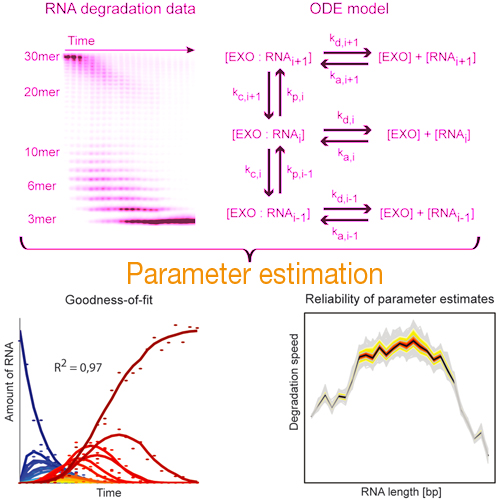Processive RNA decay by the exosome
01-Feb-2012
RNA Biology, 2011, doi: 10.4161/rna.8.1.14067, Volume 8:1, pages: 55-60 published on 01.02.2012
RNA exosomes are large multi-subunit protein complexes involved in controlled and processive 3' to 5' RNA degradation. Exosomes form large molecular chambers and harbor multiple nuclease sites as well as RNA binding regions. This makes a quantitative kinetic analysis of RNA degradation with reliable parameter and error estimates challenging. For instance, recent quantitative biochemical assays revealed that degradation speed and efficiency depend on various factors, such as the type of RNA binding caps and the RNA length. We propose the combination of a differential equation model with Bayesian Markov Chain Monte Carlo (MCMC) sampling for a more robust and reliable analysis of such complex kinetic systems. Using the exosome as a paradigm, it is shown that conventional “best fit” approaches to parameter estimation are outperformed by the MCMC method. The parameter distribution returned by MCMC sampling allows for a reliable and meaningful comparison of the data from different time series. In the case of the exosome, we find that the cap structures of the exosome have a direct effect on the recruitment and degradation of RNA, and that these effects are RNA length-dependent. The described approach can be widely applied to any processive reaction with a similar kinetics like the XRN1-dependent RNA degradation, RNA/DNA synthesis by polymerases and protein synthesis by the ribosome.











